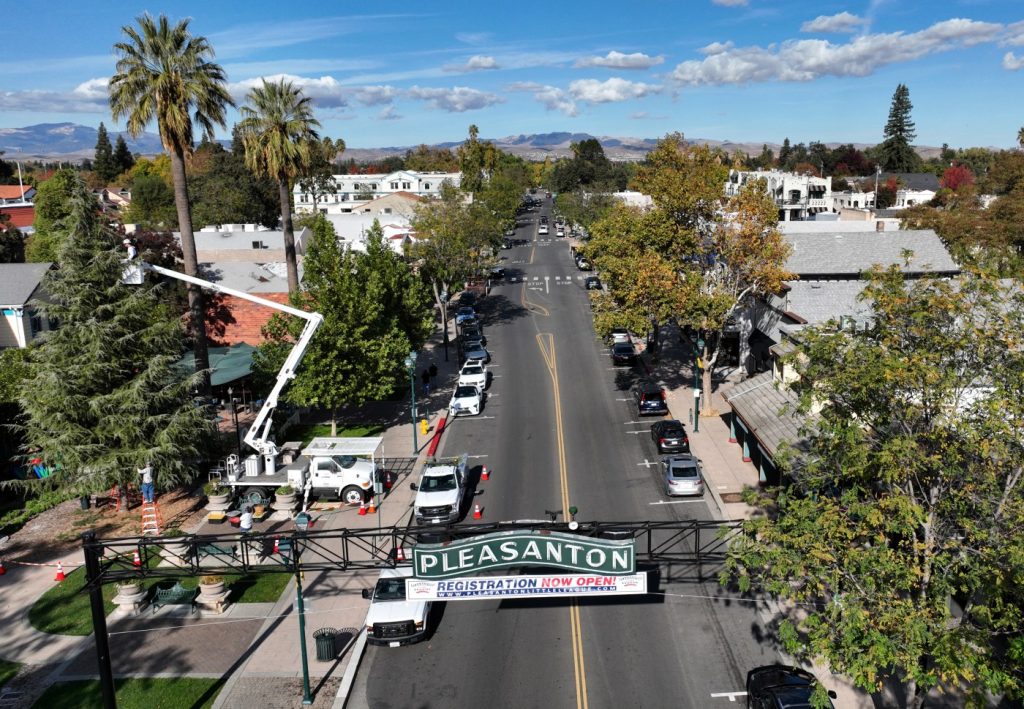PLEASANTON — An effort to pass the hotly contested first-ever Pleasanton sales tax measure appears to have failed at the ballot box this year, a result that will likely set into motion a series of major cuts to essential services in the near future.
Championed by most of the city council and challenged by a grassroots opposition, the latest election results show that Measure PP, called the “Pleasanton Essential Services Protection Measure,” will fail with 54% voting against compared to the nearly 46% in favor. With a projected impending $100-million deficit over the next eight years, it is unclear exactly how the city will look moving forward.
“Without the additional revenue from Measure PP, difficult decisions are on the horizon and we will work within existing resources to develop a balanced budget,” City Manager Gerry Beaudin said in a statement. “This will require the city council to have in-depth discussions about priorities and strategies to address our financial challenges.”
After the Pleasanton City Council in July voted 4-1 to ask voters to approve the half-cent sales tax, its supporters in office billed the measure as necessary to stave off significant further cuts throughout city departments, such as police and fire – the current sales tax rate is 10.25%. The city expected the measure to generate $10 million a year for the next 10 years, netting a total $100 million to fill budget shortfalls. But opponents of the measure said the city should instead tighten its belt elsewhere and put the measure off until another election.
The city will have to make do with what it’s got now. Pleasanton officials already made $2.5 million in cuts to the $226-million 2024 budget over the last year to get ahead of what is expected to be a severe financial situation that could affect Pleasanton residents. The city also froze multiple positions, and left over 20 positions vacant at the end of the fiscal year on June 30.
Ahead of this week’s council meeting, the city released a report which details that Pleasanton took in a higher than budgeted amount of revenue from hotel and business license taxes and other cuts to city services through the end of the fiscal year. The report shows a mid-term budget of $244 million for the 2025 fiscal year.
While Measure PP’s opponents were quick to point to the small surplus as a step in the right direction, the city pushed back against the notion that it would be significant in addressing the city’s impending financial woes. Beaudin added that “the limited available resources can only help provide funding in some, not all, program areas.”
“It’s important for the community to understand that the city is required to achieve a balanced budget every year, but to do so in the context of a budget deficit means that many critical funding needs are omitted from the budget due to lack of funding,” Beaudin said.
The city’s director of finance, Susan Hsieh, also said that “at the same time, expense growth outpaced revenue as projected, in which expenses were nearly 7% higher than the prior year, while revenues were about 1% lower than the prior year.”
“As we’ve said, the city has been committed to cutting costs, and we’ve demonstrated that in these significant near-term cuts; however, this is simply not sustainable in delivering all the programs and services that are currently provided to the community such that additional reductions will directly impact our residents and businesses,” Hsieh said.
Mayor Karla Brown, who championed the measure, said “budget cuts will likely precipitate reductions to services such as operations, recreation activities and emergency responders in our police and fire departments. The closing of a fire station is also possible.” Additionally, after taking a loss in this year’s mayoral race, Brown will not be around to decide how the city handles the impending cuts.
Doug Miller, the head of the No On Pleasanton Sales Tax committee which raised over $6,000 against the measure, enjoyed a victory following the results of the Nov. 5 election.
Related Articles
Sophie Hahn concedes race for Berkeley mayor
Why was California’s voter turnout so low this cycle?
Latest results in close Bay Area elections raise familiar question: Are recounts coming?
If Democrats want to win back the American people, does California need to stand down?
California’s slow vote count sows doubt. Here’s how one group is trying to fix that
“The community agreed with us that the situation wasn’t dire,” Miller said. “There’s still time to review the budget in more detail, look at spending priorities and look at revenue opportunities in the near term.”
Miller’s group also heavily supported Councilman Jack Balch, who appears to have dethroned Brown, according to latest election results. Balch, who has years of experience as an accountant and commercial real estate developer, was the sole dissenter who voted against putting the measure on this year’s ballot. He also favored finding other places to tighten the budget and wanted to push the ballot measure’s decision to a later date.
Miller added that if two years down the road the city’s financial situation looks more dire, he could be more open to discussing a possible sales tax measure.
“We’ve got some breathing room, at least another year, to look at more innovative ways to look at delivering services that might result in savings,” Miller said. “If we can’t find savings in the next two years, then during the election of 2026, if the city comes to the decision that they still need revenues, we could do this all over again.”


